If you’ve spotted your cat laying down or even sleeping in it’s litter box you are probably wondering what is causing this behaviour.
There are a lot of reasons why your cat may choose to lay in their litter box, they may feel safe there, they may be looking for some privacy and that’s the only place they feel they can find any, they may feel sick or they may just be a bit confused if you’ve recently changed your cat litter.
Below are 7 reasons why your cat may be laying in their litter and what you can do to help them:
Contents
1. The Litter Box Feels Safe
It’s well documented that cats love boxes, the reason for this is that they feel safe, warm and secure.
If a cat is stressed for some reason they will seek out a secure spot when they can shelter. In the absence of a cardboard box or any other suitable hiding place, your cat may choose to hide in their litter box, particularly if it is enclosed.
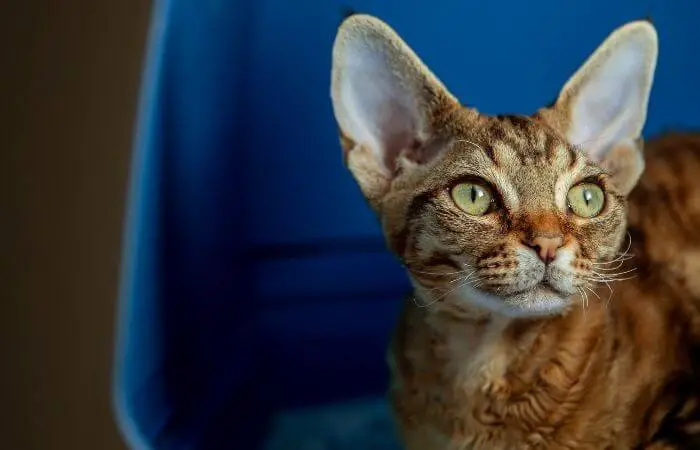
It is not uncommon for recently adopted cats to hide in their litter box because the crates that cats are often kept in at cat homes are fairly small so the litter box may feel comfortingly similar to them, it will also smell like them too so feels very familiar.
If you have recently moved home, got a new pet, have guests over or someone is setting off fireworks nearby then these are all things which may lead your cat to seek refuge in the litter box.
Pregnant cats may also choose to nest in a litter box as it feels like a safe enclosed space where they can give birth in privacy.
To resolve this you should provide some safe, easily accessible boxes and hiding places for your cat to occupy.
If your cat is newly adopted then place a blanket from their previous home in a box for them, this will help them feel more comfortable in the box and will quickly make this new box a more preferred location than their litter box.
2. They May Have A Urinary Tract Infection
Urinary tract infections (UTIs) are very painful, they make going to the toilet a long and arduous process for your cat.
UTIs will cause your cat to strain to urinate and it will also mean that they urinate far more frequently.
Your cat will spend far longer in the litter box than usual if they have a UTI.
UTI warning signs to watch out for include:
- Straining to urinate
- Blood spots in urine
- More frequent urination
- Excessive genital licking
- Urinating outside the litter box
If you notice any of these signs your should speak to your vet ASAP.
Ask a Vet
JustAnswer allows you to talk in real-time to veterinary experts for a small fee:
3. They May Have Crystals In Their Urine
Urine crystals (also known as struvite crystals) make passing urine an incredibly painful experience.
These crystals can form into small stones and grit inside the bladder which will cause pain and potential blockages. This will mean that it takes your cat far longer to empty their bladder and, if they are in a lot of pain, they may just choose to stay in there for lengthy periods of time to avoid discomfort.
If your cat is prone to snacking on human food or has a generally unbalanced diet then they are at risk of developing urine crystals.
Symptoms to watch out for include:
- Urinating outside the litter box
- Lengthy visits to the litter box
- Frequent urination
- Straining
- Discomfort when using the litter box
- Licking the genital area
- Blood spots in urine
- Lack of appetite
If your cat shows any of the warning signs above then we recommend you speak to a vet ASAP to get them sorted out.
You should also start closely monitoring what your cat is eating and ensure that they are getting a properly balanced diet. Your vet may recommend switching to a type of cat food designed specifically for urinary health.
4. Kittens Playing & Exploring
When you’re a kitten everything is fun…including cat litter!
Kittens are naturally inquisitive and very playful so a visit to the litter box is a chance to practice digging, see what the cat litter tastes like and, quite possibly, fall asleep in there!
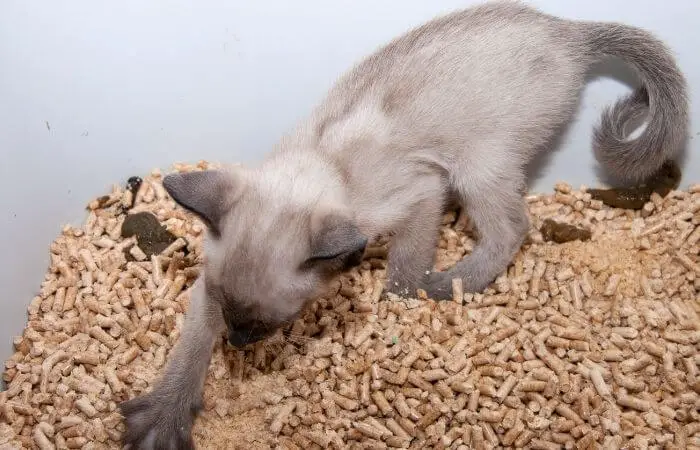
This is natural kitten behaviour and isn’t anything to worry about.
To avoid mishaps we recommend you ensure you are using a kitten safe litter. It should be non-clumping as clumping litter can expand in the stomach if ingested, potentially causing dangerous blockages.
You can also enocurage your kitten to play outside of the litter box by leaving cat toys close to the litter box.
5. They Don’t Want To Share Their Territory With A New Cat
If you have more than one cat sharing the same litter box one of your cats may stake their claim on it by laying in it, making it impossible for the other cat to use it.
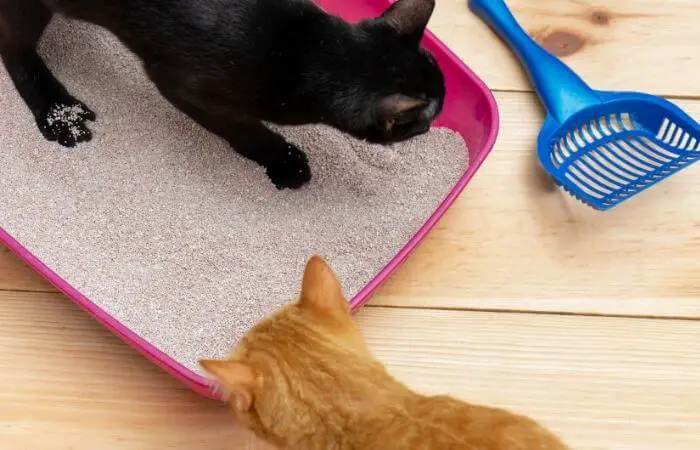
This is most likely to happen if you have recently introduced a new cat to the household, the original cat will see the newcomer as an intruder in their territory, if they notice the smell of the new cat in their litter box they may choose to stay in there to guard it against the new ‘unwelcome’ cat.
If this is your situation a simple fix is to get another litter box for the new cat.
Failing to do this means the new cat is likely to urinate elsewhere in your home (such as on a pile of clothes!).
We recommend keeping the new cat in a closed-off room initially and slowly introducing the cats to each other through scent swapping, this will help reduce territorial conflict and encourage your cats to accept one another more quickly.
6. They Are Confused By A New Type Of Litter
If your cat is used to using clumping clay litter but you’ve decided to try a different cat litter type such as a paper, walnut or silica gel-based litter then your cat may be confused by the change.

They may think it’s a toy or a new bed (especially with comfortable paper-based litter) so will spend quite a bit of time in there playing, smelling and even sleeping on the new litter.
Also Read: Why Does My Cat Freak Out When I Clean The Litter Box?
Don’t worry though when the time comes to urinate they will quickly work it out and will soon be treating it just like they treated their old litter.

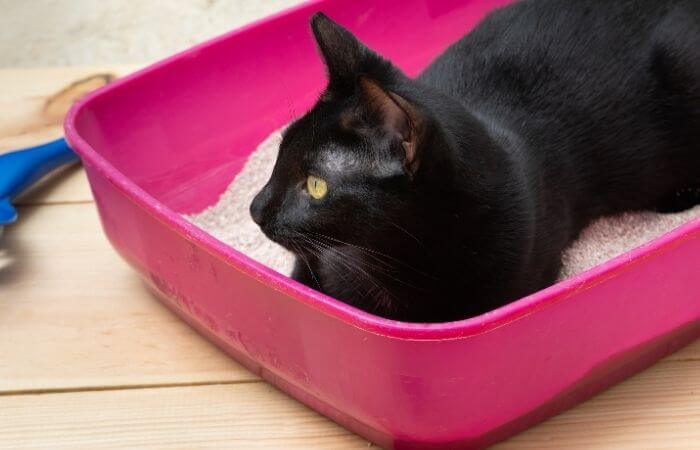

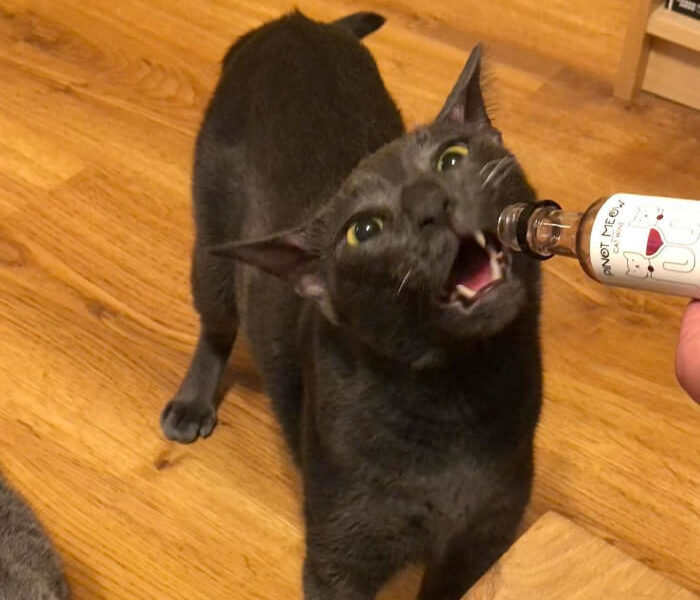




Leave a Comment